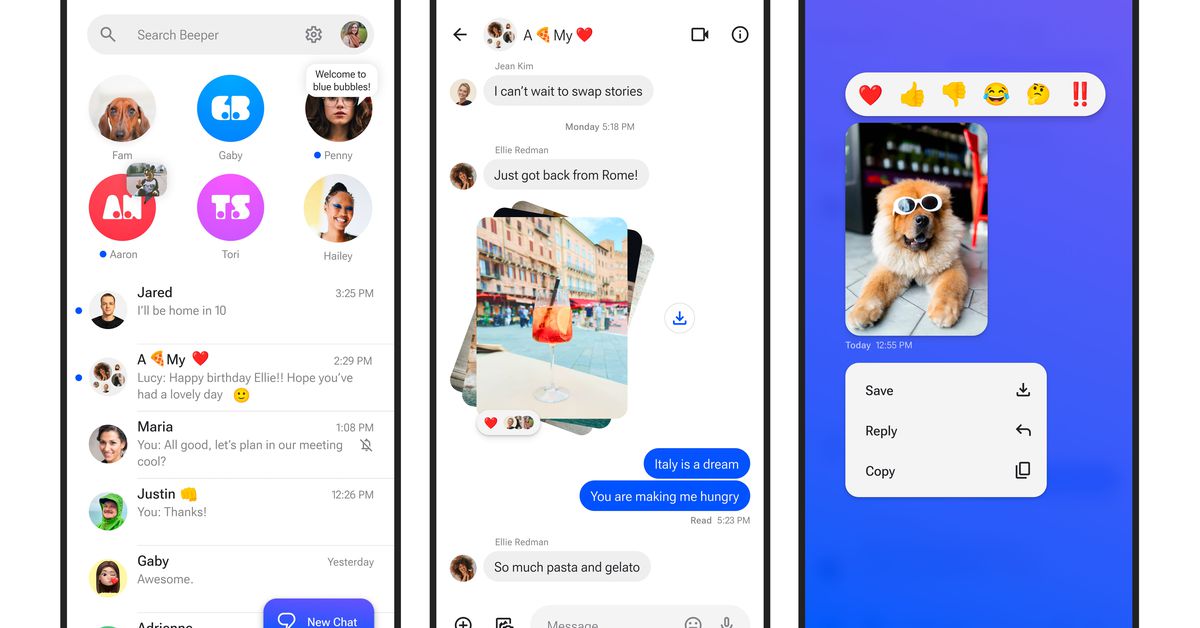• A new Android app called Beeper Mini allows users to send iMessages as blue bubbles from non-Apple devices.
• Beeper Mini bypasses traditional iMessage hacks by directly sending iMessages from Android devices.
• The app has been praised for its smooth functionality, sending messages seamlessly between Android and iPhone users.



No… When you send a “blue bubble” photo on an iPhone the file size is around 1.5MB. When you send a “green bubble” photo I think they’re resized down to less than 300KB.
Any photo larger than that won’t be delivered by some carriers. Also while iMessage photos default to HEIF format - the same compression algorithm as Blue Ray videos - MMS uses JPEG which doesn’t have a target file size feature. All you have is the width/height in pixels and an arbitrary “quality” scale.
To guarantee your photo will never be over 300KB you need to set the width/height/quality to a number that will often be under 100KB… and that’s what Apple does.
Android has a size setting, and you’ll get a delivery failure error if you set it too high for the recipient’s carrier… a lot of carriers do support larger photos… But Apple doesn’t bother with that - they want it to “just work”. Which means 100KB for green bubble photos.
The reality is quality is always going to suffer - converting an image from HEIF to JPEG is a bad idea - it’ll never look anywhere near as good as the original no matter what resolution or quality the compression is set to.
Also… iPhones don’t even take ordinary photos… by default every “photo” is a short video. When you send those to another iPhone, they get the video. Green bubbles either get a still image or worse a 100KB five second video.
… So it’s still an iPhone issue … Also, i really don’t know what this “blue bubble”/“green bubble” is referencing (other than it being chats)
If you own an iPhone, when you’re texting with a person who uses iMessage, your outgoing messages have a blue background. When you’re texting with someone who doesn’t or can’t use iMessage (usually because they use an Android device) your outgoing messages have a green background. And since the message backgrounds are kind of shaped like speech bubbles from comics, they’re called bubbles.
The design is noticeably worse for the green bubbles; the contrast isn’t as good and the color scheme doesn’t seem to match as well as with the blue bubbles. And the fact that it’s the iPhone users’ outgoing messages—not the message of their recipient—that show up in this lower-fidelity way has a pretty powerful psychological impact.
Ostensibly the color difference is so that users know when their messages are being encrypted. But in reality, it seems pretty clear that Apple keeps this in place as a marketing tool, to encourage peer pressure so that users encourage other users to get iPhones.
And it works. Studies and reports keep coming out showing that, among high school students particularly, peer pressure against Android users is considerable; and even for adults, it’s not uncommon for Android users to be left off of group texts entirely.
There are other, more meaningful differences: like the fact that non-iMessage users receive photos and videos in much worse quality (which Apple’s upcoming RCS support should fix), and chats are only end-to-end encrypted between iPhones (which Apple’s implementation of RCS probably won’t fix). But the green and blue bubbles (which RCS definitely won’t fix) are, by Apple’s design, the thing that everyone is hung up on.
It’s still an iPhone issue of butchering quality when sending over MMS. Carriers are partly to blame, but even on Verizon which has no apparent MMS size limit, iPhones till butcher images.
See my other comments. I’ve tested this. It’s Apple making anything non-iMessage seem inferior. Not that they have to, but it makes people think iPhone is superior when it’s by design.